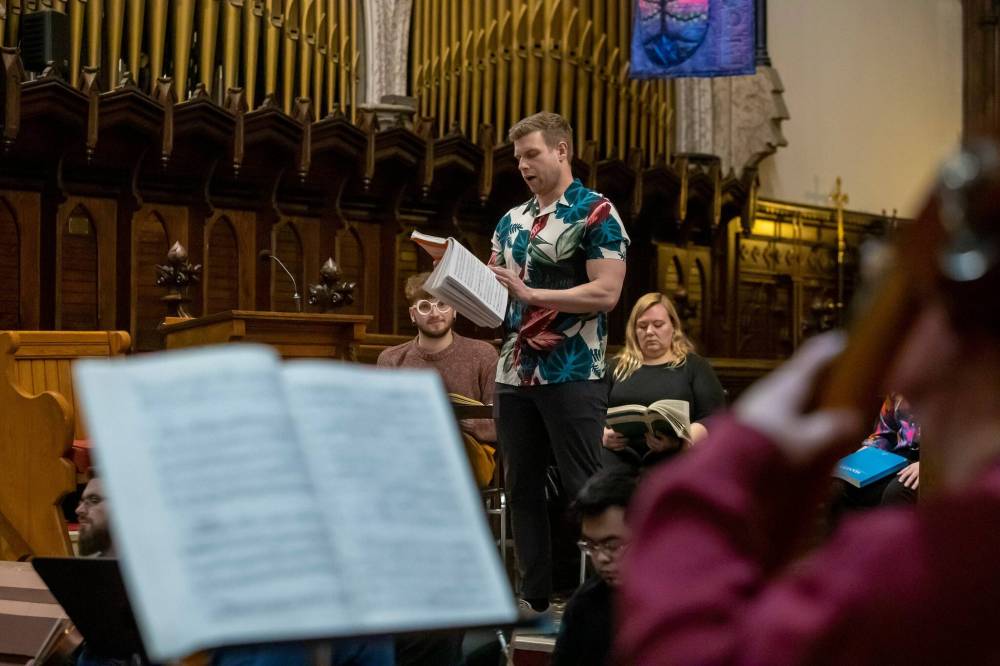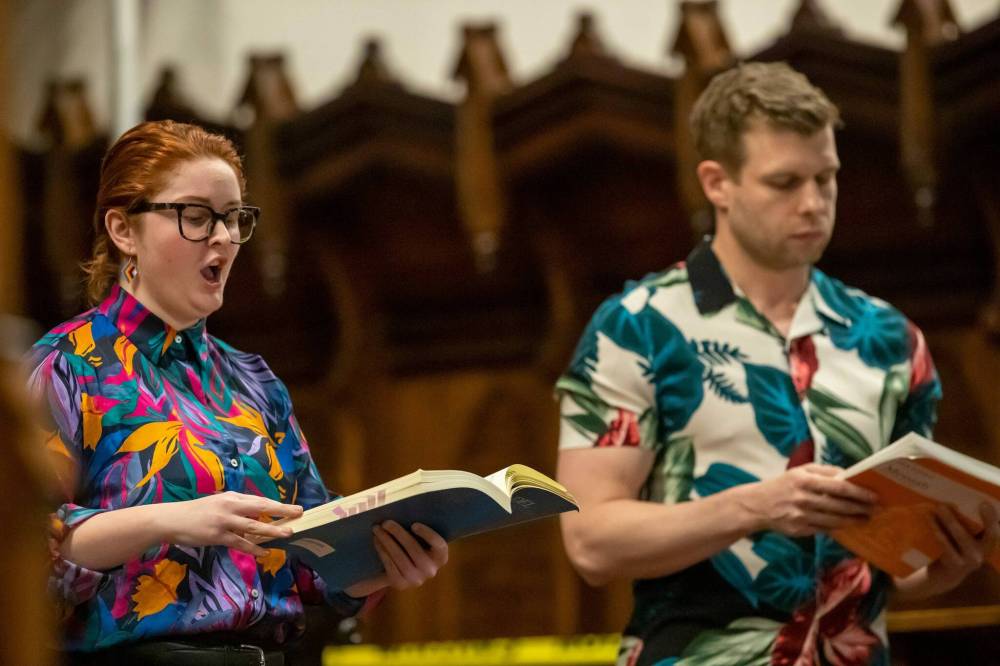Thou shalt not lie with mankind, as with womankind: it is abomination. Leviticus 18:22
The woman shall not wear that which pertaineth unto a man, neither shall a man put on a woman's garment: for all that do so are abomination unto the Lord thy God. Deuteronomy 22:5
Wherefore God also gave them up to uncleanness through the lusts of their own hearts, to dishonour their own bodies between themselves:
Who changed the truth of God into a lie, and worshipped and served the creature more than the Creator, who is blessed for ever. Amen.
For this cause God gave them up unto vile affections: for even their women did change the natural use into that which is against nature:
And likewise also the men, leaving the natural use of the woman, burned in their lust one toward another; men with men working that which is unseemly, and receiving in themselves that recompence of their error which was meet.
And even as they did not like to retain God in their knowledge, God gave them over to a reprobate mind, to do those things which are not convenient;
Being filled with all unrighteousness, fornication, wickedness, covetousness, maliciousness; full of envy, murder, debate, deceit, malignity; whisperers,
Backbiters, haters of God, despiteful, proud, boasters, inventors of evil things, disobedient to parents,
Without understanding, covenantbreakers, without natural affection, implacable, unmerciful:
Who knowing the judgment of God, that they which commit such things are worthy of death, not only do the same, but have pleasure in them that do them. Romans 1:24-32
The United Church of Christ has got to be the most hopelessly apostate pseudo-Christian denomination in the United States. The following, including the reporter's nauseating use of preferred personal pronouns, speaks for itself. As reported by Pamela McLoughlin of the Hartford Courant, October 10, 2023 (bold, links, photos in original):
Drag queen minister Marge Erin Johnson, left, with Sandra Montes, dean of of chapel at Union Theological Seminary.
Being a drag queen isn’t a hobby for James Admans. It’s a religious calling.Marge Erin Johnson is a drag queen minister who helps the LGBTQI plus community connect with religion, church. Contributed.
Marge Erin Johnson, a drag queen who spends most of their life as James Admans, has started a “drag church” organization, Theology Queen, LLC.
Admans calls themselves a “queer minister,” preaches unapologetically and peppers business promotions with phrases such as, “Drag me to church,” and “the most extravagant way to worship God!”
Johnson’s feather rainbow jacket (a nod to Joseph’s coat of many colors ) screams Pride, their eye shadow and fake lashes say it’s OK to be who you are – and the rhinestones on their dress shine like their humor.
Johnson, 33, is a 2021 graduate of Union Theological Seminary in New York City who is very adept at citing scriptures and their history.
In the drag role Admans is hired at churches to take the pulpit on Sundays, in hopes to connect with the LGBTQI+ community, as well as the rest of the congregation. “It provides a nonjudgmental sacred space for people to express themselves proudly,” Admans website notes of his work.
“When you go to a service led by a drag queen it could be spiritually healing,” Admans said. “It’s a celebration of how wonderfully created we all are. You can show up as your authentic self. What God created you to be.”
While the Johnson persona identifies as a she, Admans, 33, a New Haven resident, identifies by the pronouns they, them, their.
Admans is a minister for United Church of Christ who fills in as their male self for ministers who are out for various reasons. Admans also is looking for a full-time job at a church as themselves.
Marge Erin Johnson is a side endeavor for which Admans charges a sliding scale fee of $200 to $500 an appearance, depending on many factors, including the church size and ability to pay, as the main mission is to educate and heal.
Johnson’s fans say they love all Marge brings to the table as a preacher, activist and drag queen.
The church supports the drag ministry.
The Rev. Noah Brewer-Wallin, assistant director of Diversity, Equity, & Inclusion for the Southern New England Conference, United Church of Christ, said he’s “very excited” about Admans’ call to drag ministry.
“Because drag is so vilified in our culture right now, even people who want to support drag performers don’t always have a good understanding of what drag is. It can be difficult to parse how drag is both related to and distinct from sexual orientation and gender identity,” Brewer-Wallin said.
“I’m grateful that James offers themself as an educational resource as part of this ministry, giving church attendees the chance to ask questions and honestly explore,” Brewer-Wallin said.
Brewer-Wallin said drag belongs in church because it is “a form of creative expression in which people reflect back the creative nature of God.”
“Drag is often playful and irreverent. Playfulness and irreverence are an invitation to enjoy our God-given bodies that giggle and belly-laugh, and to see the sacred all around us even in the places where we have been taught God and the sacred don’t belong,” Brewer-Wallin said.
He said drag is also a justice issue because “they threaten the ability of all people to express themselves the way they want to…” including issues such as women wearing pants.
Marge Erin Johnson spoke recently at the Unitarian Universalist Church of Greater Bridgeport, in Stratford.
UUCGB is a small lay-led church and also has guest ministers, so after member Emily Prokop met Marge at Pride in the Park in Norwalk this summer, Prokop arranged an appearance.
“I would have loved to have gone to a church where someone like Marge would feel welcome when I was growing up,” Prokop said. “Marge’s service felt like part religious studies discussion, part LGBTQI+ empowerment, part call for spiritually-ship and 100% fabulous and glamorous.”
During an open discussion portion of the service, people shared their experiences, insights and freely asked questions, Prokop said.
Marge answered “thoughtfully and gracefully,” Prokop said.
Prokop said the service brought a new awareness to the congregation about a story from the Bible, Joseph and the coat of many colors. Prokop said the choir got to sing Dolly Parton’s “Coat of Many Colors.”
Admans said: “I love the story of Joseph in Genesis. There is a queer theological interpretation that the coat of many colors is something akin to a princess dress. Scholars aren’t sure how to translate this accurately. It’s its been called a beautiful robe, an ornamental robe.”
Joseph is among several Biblical figures who can be identified as non-conforming, Admans said.
Admans also speaks about how homosexuality appeared specifically in the Bible in later translations, and how they see this perpetuating discrimination against the LGBTQIA+ community.
“Prior to this, the passages that we now associate with homosexuality used different terminology and were interpreted in various ways, often focusing on behaviors like temple sex-work or non-consensual sexual acts,” Admans said.
“The introduction of the word homosexual into the Bible was a result of evolving language and societal context. This change had significant implications, as it fundamentally altered the interpretation of these passages and has been used to justify discrimination against the LGBTQIA+ community,” Admans said, of their interpretation of the passages.
At the welcoming and affirming Unitarian Universalist church in Stratford, attendees were welcomed, as they always are when Marge is there, with a table of rainbow hats, beads, boas so they could join in the fun.
“So people can participate to make it fun, in a way that’s loving,” they said. “If were going to do it, let’s connect.”
Admans grew up in West Haven where they were a “churchy kid” and Admans thanks their mom and grandmother for taking them to church every Sunday.
Admans graduated from Amity High School in 2008 and later earned an anthropology degree from Southern Connecticut State University before getting the calling and enrolling in seminary. They hold a master’s of divinity degree.
The pandemic and Marge Erin Johnson
Admans got into drag during the pandemic when the days were long. Admans had thought for a while about trying it, but was “intimidated.”
“A lot of people found out about themselves in lockdown. I found drag,” Admans said.
Marge Erin Johnson emerged during Admans second year of divinity school and someone suggested the preaching.
“Someone else saw the potential. She saw how the spirit was at work during that ministry.”
It takes Admans about three hours to transform into Marge Erin Johnson.
Admans chose the name Marge Erin Johnson because it was something “funny yet, friendly.”
“I didn’t want anything too shocking,” Admans said, noting they liked the way Marge Erin sounds like “margarine.” They said they’ve always loved the name Marge.
“I love her. I think she’s fabulous,” Admans said of the Marge persona. “It’s something I feel called to share with other people.”
Sandra Montes, dean of of chapel at Union Theological Seminary was “super grateful,” that Admans was able to do several drag chapels while at the school.
“I am a drag lover and have always wanted to do some kind of drag eucharist or church service,” Montes said. “We all want to be seen. We all want to belong. We turn to religion and faith for comfort, for acceptance. Many of us have been told we’re not good enough, particularly by colonized Christianity that is, unfortunately, tied to white supremacy and white evangelical corruption.”
Montes said if she went to a church and saw Marge preaching or teaching she would say “wow,” in a positive way.
“There are so many churches that call themselves affirming and open to all and welcoming but they usually have a caveat,” Montes said. “So, seeing a minister in full-on gorgeous drag would absolute say to me: this is a place worth looking into.”
“Marge’s message is that there is space for everyone to belong, particularly in faith communities,” Admans said.
“Marge teaches that queerness and faith do not have to be at odds, but can coexist and even be beautifully interwoven to create a profound spiritual life. Marge’s message is one of inclusion and acceptance, promoting the understanding that all are welcome at the table of Jesus.”
Marge is next booked for Sunday, Oct. 29, at Fort Washington Collegiate Church in New York City.
Drag queen minister Marge Erin Johnson outside the Unitarian Universalist Church in Stratford where she recently gave a talk. Contributed.
I had to chuckle when I looked at the website of Fort Washington Collegiate Church. According to a statement issued by the church on February 7, 2023:
We are open, affirming, and accepting to all–no matter where you are on life’s journey. We have been a valuable community resource for generations. We are committed to social justice and making a positive impact in the lives of the residents of Northern Manhattan. We are led by our mantra “Love on the Move.”
It’s true. FWCC is in financial distress and faces risk of closure...
The sooner these churches close, the better. If they don't close their doors, the Lord Himself will do it for them.














































